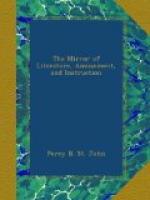“Eh, sirs!” said an old man, brushing a tear from his eye, “I never thoucht to ha’ seen the like o’ this day’s wark—and my forbears have had a bit o’ farm under the laird’s a hundred an’ saxteen year, and better nor kinder folk to the puir man never lived.”
Mr. Nibble, who was Messrs. Sharke’s agent, was bustling about, and I found him engaged with a fat, pompous little fellow, the auctioneer, from a neighbouring town.
“Sad business this, Mr. ——,” said he, “Fernlands is in a sad taking about it, I believe, but things of this kind will occur, you know; and I always say what can’t be cured must be endured, eh.”
I turned with an ill-concealed expression of disgust from this man, and entered the house in search of my friend, for N—— would not quit the old place to the last. There is something melancholy in viewing a sale at any time—the disarrangement of the furniture—the cheerless and chilling aspect of the rooms—the dirt, the bustle, and the heartless indifference one witnesses to the misfortunes of others—all come home forcibly to the feelings. After stumbling and striking my shins amongst piles of chairs, and furniture, and carpets, disposed in lots over the now comfortless apartments, I at last reached the study door where I had spent many a happy hour with N——. I entered; the room was stripped of part of its furniture, the books lying dispersed in heaps over the floor or on the massive table, at the side of which N—— was seated on the only chair left in the apartment. He was at first unconscious of my entrance.
“My dear sir, this is kind indeed,” he said as I advanced, struggling with his feelings, “but take a chair,” and he glanced round the room with a bitter smile, as he observed there was none, “my friends are kind you see, they think chairs are useless things....”
The loss of his land affected him more than I can describe. He had been brought up upon it, and it had become as it were part and parcel of himself; it was not an ordinary loss. The noise and bustle in the house and sundry interruptions from inquisitive eyes, warned us, as N—— said, that “we must jog.” As we were rising, I accidentally inquired whether he had received his letters that morning. “Good God!” he exclaimed, “I totally forgot, and poor Andrew I fancy is too much occupied in bemoaning the fate of the horses, to have thought of it; but we can get them when I return with you this afternoon.”




